Weijimlu, Darsana, Bai Koyu, Sulaja and Shely reflect on their participation in the National Faculty Development Programme organised by MANAGE during 26 Feb-1 March here.
CONTEXT
Agricultural Extension has undergone massive changes in recent years. New theoretical perspectives and practical approaches are complementing its rapid growth. The revised post-graduate and PhD syllabus of ICAR’s agricultural extension education has redefined the role of this discipline beyond the transfer of technology. The syllabus highlights the importance of Extension and Advisory Services (EAS) in enabling innovation by playing a bridging role between the various actors within the Agricultural Innovation System (AIS). There is a need to develop the capacities of faculty, researchers, extensionists and extension scholars to adapt to these transitions. Recognizing the need, the National Institute of Agricultural Extension Management (MANAGE), Hyderabad, under the University Alliance Programme, organized the National Faculty Development Programme on ‘New Frontiers in Agricultural Extension’ from 26 February to 1 March 2024. The programme’s aim was to familiarise participants with the emerging areas in extension research, practice and policy and to explore how these new and emerging areas are integrated into extension teaching and training. The five-day programme had 17 participants from the ICAR research institutes, Krishi Vigyan Kendras (KVKs), Central University, State Agricultural Universities (SAUs), Private Universities as well as research scholars.
RESOURCE TEAM
The programme was successfully planned and directed by Dr Saravanan Raj, Director (Agricultural Extension) with Dr Neethu B Nair (MANAGE Fellow) and Dr Sandipamu Raahalya (MANAGE Fellow) acting as Programme Coordinators. The modules on Agricultural Extension Innovation and Agripreneurship was facilitated by Dr Saravanan Raj, Dr Neethu B Nair and Mrs Anusha Reddy Nalla. Fascinating sessions on New Capacities in extension and Policy Engagement for extension were led by Dr Rasheed Sulaiman V, Director of the Centre for Research on Innovation and Science Policy (CRISP), Hyderabad. Discussions on agroecological extension were conducted by Dr GV Ramanjaneyalu, Executive Director, Centre for Sustainable Agriculture, Secunderabad.
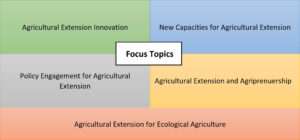 Figure:1 Training content
Figure:1 Training content
AGRICULTURAL EXTENSION INNOVATIONS
The role of Agricultural Extension has become increasingly prominent as it integrates into the Agricultural Innovation System (AIS). In the evolving landscape, innovation is perceived as an outcome, a process, and a mindset. The AIS approach provides an enabling environment for innovation, redefining the roles of extensionists in order to enhance innovation capacity within the system. This includes co-innovating and co-creating with members of the innovation network. Deep learning of the theme fosters active interaction among diverse stakeholders, enhancing human capacity for continuous innovation and adaptation to socio-economic and environmental changes. Communication is critical for network building, social learning, dynamics of power, and conflict within the AIS.
The session commenced with a card exercise to recall and document innovations in extension that participants have encountered. It also highlighted the inspiring stories of sustainable innovation systems nationwide. Discussions on inspiring stories such as Agri Entrepreneurs Service Centre of ICAR-KVK, Erode, farmer entrepreneurs as key mentors in youth agripreneurship, innovation systems in area wide community extension approach of CPCRI Kasargode, Rythu Bharaso Kendras, IARI Post Office linkage extension model, climate-smart village and e-choupal, were quite interesting. Agricultural extension needs to enhance their competencies in digital innovation. It’s essential to acquire skills to locate information, create content, evaluate, use, share, collaborate and communicate through digital devices.
From the session we learned how identifying the right stakeholder in Agricultural Innovation Systems (AIS) by interacting with stakeholders and taking a comprehensive approach to problems could be beneficial. For instance, during the session, we discovered how Tripura State’s System of Rice Intensification (SRI) was made more widely known by using the role of Panchayati Raj Institutions in AIS. In addition to Panchayati Raj Institution, additional parties participating in spreading awareness of SRI systems among farmers included the State Agricultural Department, other institution’s training divisions, funding organizations, and political figures. Similarly, we were also introduced to how the Centre for Sustainable Agriculture (CSA), located in Secunderabad, used innovative strategies to identify effective stakeholders and successfully created their own innovation system. In order to find organic produce for temple offerings, CSA liaised with a number of temples, and the produce was directly purchased from organic growers.
We gained insights on how extension has redefined its role in connecting with stakeholders and viewing issues holistically in Agricultural Innovation Systems (AIS). We recognized the importance of documenting and creating stories in the discipline.
NEW CAPACITIES FOR AGRICULTURAL EXTENSION
Extension and Advisory Services (EAS) currently need new capacities to support farmers as they face several new challenges. These include issues related to sustainably enhancing yields, adapting to changing climate, dealing with uncertain market conditions, changing consumer preferences, and new quality standards. There is also a need to attract and retain youth in agriculture, and support more women farmers. Fortunately, we now have a larger number of diverse EAS providers representing the public, private, NGOs/CSOs and farmer organizations who can provide different types of support. To deal with the new challenges, EAS needs to organize producers and assist them in accessing different services, facilitate access to credit, inputs and output services, and also for mediating conflicts. This situation necessitates the active involvement of extensionists in advocating policy changes, creating, and convening innovation platforms and to engage in networking and partnership building.
Within EAS, new capacities are needed not only at the individual level but also at the organizational and enabling environment levels. The GFRAS position paper, the New Extensionist, clearly articulates these capacities in detail. GFRAS has developed several training modules under its New Extensionist Learning Kit (NELK) to support capacity development. Several countries have adapted these modules to develop new training modules and new courses for extension students. The new ICAR curricula for the Master’s and PhD level have incorporated several aspects from these modules. Most of the national and international agencies are looking for candidates with a new understanding of Innovation, Extension and Scaling up and this understanding is essential for students to compete in the current job market. To develop new capacities the first step is to undertake a capacity needs assessment. AESA has developed a facilitator’s guide for capacity needs assessment (CNA) and by using this guide capacity gaps that need strengthening at different levels were identified in several countries. Experiences from such CNA workshops were discussed during this session.
POLICY ENGAGEMENT FOR AGRICULTURAL EXTENSION
Development, sustainability, and effectiveness of EAS depends on a supportive and policy-based environment. Lack of a legislative and policy framework for EAS has been one of the main reasons for the decline of extension provision in many developing countries. Only a few countries, such as USA and South Korea, already have a legislated extension policy. In most countries extension is mentioned in just one or two paragraphs in a policy document. But over the last two decades, several countries such as Bangladesh, Cambodia, Kenya, Malawi, South Africa, Uganda, etc., have developed national extension policies. To support countries in developing extension policies, GFRAS has come up with a Policy Compendium that provides background information, inputs, ideas and hands-on guidance for decision making and facilitation of successful policy processes for EAS. GFRAS has also developed a NELK Module on Policy Advocacy for RAS.
Globally there is a recognition that policy engagement is one of the core competencies for EAS providers, especially those at the senior management level. Keeping this in view the new ICAR extension curricula for the Master’s and PhD programmes has a course on Policy Engagement and Extension. Beyond developing specific extension policies at the national level, influencing policies is also critical for scaling up knowledge and to achieve impact at scale. The resource person emphasised the role of policy in shaping the performance of extension, the need for producing policy relevant evidence, importance of enhancing capacities to interact with policy actors, and how to participate in the policy development process. We also learnt about the importance of policy briefs and how to develop these.
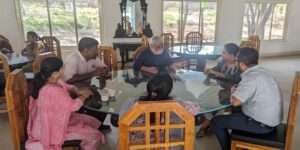 Breakroom talks: Dr Sarvanan Raj (Director, Agricultural Extension, MANAGE), Dr Rasheed Sulaiman V (Director, CRISP) and other faculty members exchanging their experiences and views.
Breakroom talks: Dr Sarvanan Raj (Director, Agricultural Extension, MANAGE), Dr Rasheed Sulaiman V (Director, CRISP) and other faculty members exchanging their experiences and views.
AGRICULTURAL EXTENSION AND AGRIPRENEURSHIP
Entrepreneurship in agricultural and allied sectors involves the development of products and processes that are market-oriented, community development-oriented, as well as sustainable in nature. Agricultural entrepreneurship has taken countless identities and forms to engage farm and rural youngsters to bring change in the agricultural sector and to explore the route to it. The speaker of this session shared examples on how to sustain the agricultural ecosystem by applying innovations that can mitigate the risk associated with farming in the present fast-changing scenario. Extensionists play a pivotal role in promoting entrepreneurship. Co-creation, co-innovation, facilitation and networking empowers the entrepreneurial ecosystem. Concepts and practices of value chain extension has great potential from an entrepreneurship perspective. The session provided an overview of agri-startups in India, role of agri-tech in integrating resolutions for farming challenges, and landscape of the incubation centre at MANAGE. We acquired much understanding on startups under different focus areas working with MANAGE-CIA.
From this session we realized that enabling digital agripreneurship and enhancing digital innovation skills are two competencies vital for agricultural extension professionals if they want to upgrade themselves in this domain and thus remain relevant in the rapidly changing environment. The speaker shared his personal experience with developing e-Arik, an ICT-based agro-advisory services app, and also on the scope of digital agripreneurship through the stories of digital startups, such as 1917iTEAMS, Pashushala.com, stellapps, etc.
AGRICULTURAL EXTENSION FOR ECOLOGICAL AGRICULTURE
Extension and business strategies for ecological farming was introduced by Dr Ramanjaneyulu. He stated that the food consumed today has poor nutrition when compared to the food consumed by previous generations. This can be attributed to the low nutrient contents in the soil due to the excessive use of chemicals and fertilizers. Hence, there is need for embracing an agroecological approach to ensure transition to sustainable agriculture. The Centre of Sustainable Agriculture (CSA) along with Shahaja Aharam and Krishna Sudha Academy for Agroecology are working as change agents to meet the agro-ecological transition at the (1) agroecosystem level by regenerative and sustainable agricultural practices; and (2) food system level by building an ecosystem for transition via policies and institutions. Innovations, people, communication channels and contextual factors linking the agroecology system are the actors in transition. Standardising agroecological practices and providing complete support services would empower adoption and attainment of scale. There is need for incentivising consumption of agroecological products and procuring and supplying these through the public distribution system so that farmers during the transition period get compensated for their efforts to ensure a sustainable environment.
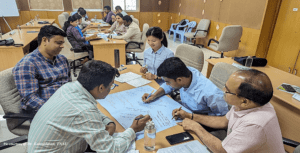 Rebuilding mindsets: Group discussion on learnings from the previous session
Rebuilding mindsets: Group discussion on learnings from the previous session
It was fascinating to learn how community resource persons and farmer field schools help farmers in promoting adoption of technologies among other farmers. Strategies such as soil test-based organic transition strategies and community bio enterprises ensure use of scientific approaches in the community extension system. The importance of farmer collectives set up as farmer producer organizations (FPO), FPO hub, and farmer service centres was highlighted. Digital innovations in CSA as pestoscops, e-krishi digital services, Kisan Mithra farm advisory services were also discussed. Scaling up of innovative market models such as Shahaja Aaharam organic shops, and Participatory Guarantee system of organic certification, can facilitate the transition to ecological agriculture.
PRIORITY SETTING IN EXTENSION RESEARCH
The session on Research Priorities in Extension was thought provoking. Researchers need to reorient themselves for integrated system perspective extension research. Global concerns such as climate change, food security, agri-food value chains and national priorities of natural farming, agriTech, role of civil society organizations, monitoring and evaluation, exploring agricultural innovation systems, etc., can be the focus of new research. The exhaustive list of ideas presented by the session broadened our perspectives on what could be relevant topics for our research.
Exposure visits
Sahaja Aharam is a federation of farmer producer organisations in Andhra Pradesh, Telangana and Maharashtra. Here farmers follow organic/natural farming practices. All the farmers are certified under NPOP organic certification or Participatory Guarantee System by the National Centre for Organic Farming. Our exposure visits to the collection centre and sales outlet of Sahaja Aaharam provided glimpses of activities and processes in the collection, packaging and marketing of organic products from FPOs supported under the Centre for Sustainable Agriculture.
 Exposure visit to Shahaja Aaharam Producer Company Ltd outlet and warehouse, on 27 February 2024
Exposure visit to Shahaja Aaharam Producer Company Ltd outlet and warehouse, on 27 February 2024
C-DAC Hyderabad
The Centre for Development of Advanced Computing (C-DAC) is the premier R&D organization of the Ministry of Electronics and Information Technology (MeitY) for carrying out R&D in IT, Electronics and associated areas.
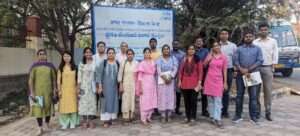 Exposure visit to C-DAC on 29 February 2024
Exposure visit to C-DAC on 29 February 2024
At the centre we learned about block chain, big data analysis, artificial intelligence, and Internet of Things and its application in the field of agriculture. Resource persons introduced the applications developed at the centre such as balsahara, meghshikshak and m-kavach. A sensor-based IoT application called harithapriya provides location-specific farming advisories based on microclimate.
Exploring the City of Pearls
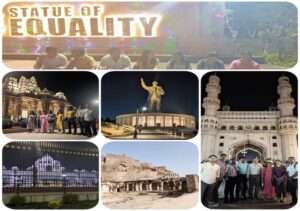 Exploring Hyderabad, The City of Pearls
Exploring Hyderabad, The City of Pearls
Recap and Review Sessions
Every morning our sessions began with an engaging recap session. We were split into three groups and given charts and colour pencils to discuss what we had learnt from the previous day. With this we were able to assimilate the knowledge gained from the discussions and to incorporate the training objectives. This ensured active learning and made our groups more vibrant.
Another interesting activity was the review session on Good Practice Notes. Dr Saravanan Raj selected and shared these notes from GFRAS with each of us. We were asked to review and reflect on our findings. We had discussion forums to discuss each of these notes. Each one of us contributed to the discussions based on our experience and knowledge on these topics.
 Recap of the previous sessions
Recap of the previous sessions
During the last hour of training, we discussed our insights on the future responsibilities of extension professionals. We were asked to enumerate – in one word – the qualifications we thought all agricultural extension specialists ought to possess. We attempted to use the ‘word cloud format’ shown below to illustrate what we had learned (Figure 2).
We adhered to the classic roles that have contributed to extension services since the Green Revolution, such as Transfer of Technology, Vocational trainers, PRA Approach, and so on. These roles must continue to be performed in the usual way. However, there is an urgent need to embrace new roles as agricultural extension currently demands professionals with a broader perspective. Figure 2 indicates the new roles (such as Extension Policy, Facilitation, Co-innovator, etc.) that extension professionals need to adopt at academic, research and field levels.
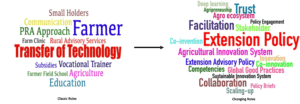 Figure 2: Learnings of participants on Roles of Agricultural Extension Professionals – old classics and changing roles now
Figure 2: Learnings of participants on Roles of Agricultural Extension Professionals – old classics and changing roles now
Our Impressions
- The faculty development programme was precisely designed to introduce the new frontiers in Agricultural Extension. The programme focused on five emerging themes. We were educated on various thematic areas through the experiences and practices of the resource team.
- The training programme’s emphasis was on changing the mindset of extension professionals beyond technology transfer, conducting trainings, and information dissemination to facilitation, community mobilization, shaping policies and engaging stakeholders. This would enable us to effectively deliver services to the farming community and facilitate an agricultural innovations ecosystem.
- Engagement of agricultural extension faculty, professionals and scholars in learning and discussing the global cases depicting agricultural extension approaches and good practices taught in trainings like this can enhance critical and creative thinking.
- The active group discussion and group assignments were particularly helpful in promoting cross learning among the participants. We hope the networking that we initiated within the team will go on to facilitate our future collaborations.
- EAS is evolving. To include new approaches and to reorient the roles of extension professionals, there is a need to redefine extension curricula, practices and research. To achieve this, mandatory periodic training programmes should be implemented for extension professionals. This will also encourage faculty to implement new curricula at institutions and organizations.
Acknowledgements
We much appreciate the efforts made by Dr Saravanan Raj, Dr Neethu B Nair, Dr Sandipamu Raahalya, and the entire team who contributed effectively to the management of this training programme. We are also grateful for the hospitality extended to us throughout the programme.
 Ms. Weijimlu Tayang PhD Scholar, TNAU, Coimbatore-03, Tamil Nadu, Email: tweijim@gmail.com
Ms. Weijimlu Tayang PhD Scholar, TNAU, Coimbatore-03, Tamil Nadu, Email: tweijim@gmail.com
 Dr. Darsana S, Assistant Professor, Central Training Institute, Kerala Agricultural University, Thrissur Email: darsana.s@kau.in
Dr. Darsana S, Assistant Professor, Central Training Institute, Kerala Agricultural University, Thrissur Email: darsana.s@kau.in
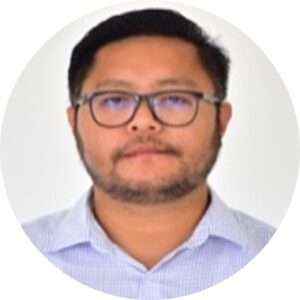 Dr. Bai Koyu, Faculty of Agricultural Sciences, Rajiv Gandhi University, Rono Hills, Doimukh, Arunachal Pradesh Email: bai.koyu07@gmail.com
Dr. Bai Koyu, Faculty of Agricultural Sciences, Rajiv Gandhi University, Rono Hills, Doimukh, Arunachal Pradesh Email: bai.koyu07@gmail.com
 Dr. Sulaja O. R, Assistant Professor, Communication Centre, Kerala Agricultural University, Thrissur Email: sulaja.or@kau.in
Dr. Sulaja O. R, Assistant Professor, Communication Centre, Kerala Agricultural University, Thrissur Email: sulaja.or@kau.in
 Dr. Shely Mary Koshy, Assistant Professor, Department of Agriculture, Karunya Institute of Technology and Science, Coimbatore, Tamil Nadu Email: shelymary@karunya.edu
Dr. Shely Mary Koshy, Assistant Professor, Department of Agriculture, Karunya Institute of Technology and Science, Coimbatore, Tamil Nadu Email: shelymary@karunya.edu

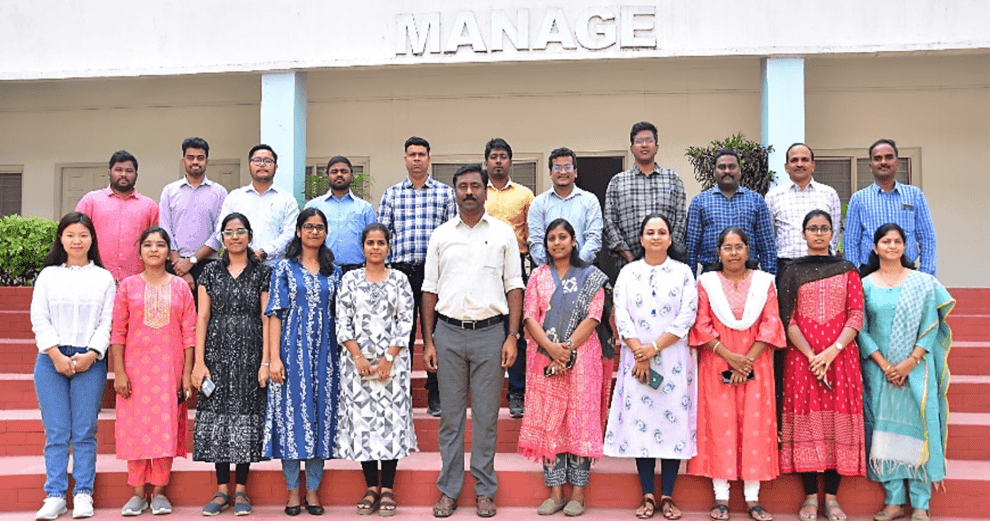

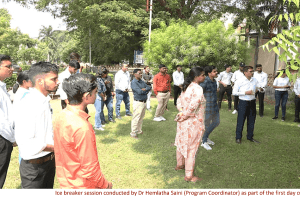
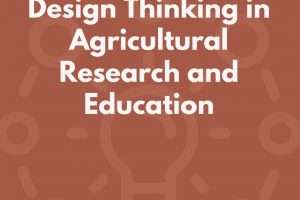
Happy to see many youngsters are showing interest in this kind of demand driven training programmes. Unfortunately, in many institutions mechanisms are not well placed to sponsor young faculty to such programs which are really very helpful compared to many routine trainings including conferences with huge gatherings often with little gains! Congratulations to authors and AESA for contributing to professionalism in Agricultural Extension.